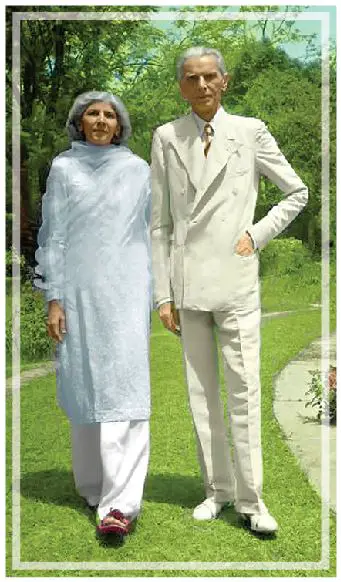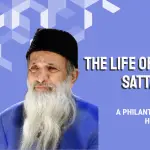Introduction
Fatima Jinnah was born on July 30, 1893, in Karachi, then part of British India. Her parents were Jinnah Poonja and Mithibai Jinnah. She was the younger sister of Muhammad Ali Jinnah, the founder of Pakistan.
After the creation of Pakistan in 1947, Fatima Jinnah continued to support her brother until his death on September 11, 1948. Thereafter, she played a key role in nation-building, advocating for women’s rights, and spotlighting social issues.
In 1965, she contested the presidential election against military ruler Ayub Khan but lost due to alleged rigging. Her defeat caused outrage amongst her supporters and is considered a setback for democracy in Pakistan.

Fatima Jinnah passed away on July 9, 1967 in Karachi. To this day, she remains one of the most influential female figures in Pakistan who is revered as a champion of democracy and women’s rights.
Early Life & Family Background
| Full Name | Fatima Jinnah |
| Also Known As | Māder-e Millat (Mother of the Nation) |
| Date of Birth | July 30, 1893 |
| Place of Birth | Karachi, British India (now Pakistan) |
| Parents | Jinnah Poonja & Mithibai Jinnah |
| Siblings | 8, including Muhammad Ali Jinnah |
Key details about Fatima Jinnah’s early life and family background:
• Born on July 30, 1893, in Karachi, then part of British India
• Parents were Jinnah Poonja and Mithibai Jinnah
• Had 8 siblings including her elder brother Quaid-e-Azam Muhammad Ali Jinnah
• Received early education from private tutors at home in Karachi
Fatima Jinnah was born into an influential Ismaili Khoja family. Her father Jinnah Poonja was a prosperous merchant. As a child, Fatima received education through private tutors along with her siblings at their family home in Karachi.
Being the younger sister of Muhammad Ali Jinnah, she greatly admired her elder brother who would later become one of the leading figures of the Pakistan Movement.
Education & Early Public Life
| 1892-1900 | Homeschooled in Karachi |
| 1900-1909 | Bandra Convent High School, Bombay |
| 1916 | Enrolled at Dr. Ahmad Dental College, Calcutta |
| 1923 | Qualified as a dentist |
Key aspects of Fatima Jinnah’s educational background:
• Initially homeschooled in Karachi from 1892-1900
• Attended the Bandra Convent High School in Bombay from 1900–1909
• In 1916, enrolled at the Dr. Ahmad Dental College in Calcutta
• Qualified as a dentist in 1923 after 7 years of studying dentistry
After completing her early education in Bombay, Fatima Jinnah pursued higher education by enrolling at the highly competitive Dr. Ahmad Dental College in Calcutta in 1916. At that time, it was difficult for Muslim women to gain admission into professional colleges. But Fatima was determined to receive professional qualifications.
In Calcutta, Muhammad Ali Jinnah would arrange for Fatima to stay at a hostel for Muslim girls called the Sulemani Muslim Hostel. He remained supportive of her academic pursuits throughout. After qualifying as a dentist in 1923, she moved her clinic to Bombay. However, she would soon leave her dental practice to join her brother in his political struggle.
Association with Pakistan Movement
• Accompanied Jinnah to every Muslim League conference after 1928
• Became a close advisor to her brother on political matters
• Worked tirelessly for women’s inclusion into the mainstream freedom movement
• Helped raise funds, and organize public demonstrations for the Pakistan Movement
After returning from London in 1934, Muhammad Ali Jinnah suffered from severe health issues including lung problems. During this difficult period, Fatima Jinnah nursed her elder brother back to health. She also encouraged him to re-enter politics and resume leadership of the Muslim League.
Fatima would famously accompany Jinnah to every major Muslim League session after 1928. Under her brother’s stewardship, the Muslim League adopted the momentous Pakistan resolution in 1940 which called for Muslim-majority provinces in the northwest and northeast to be constituted into independent states.
As a public speaker, Fatima addressed meetings and rallies urging women to join the Pakistan Movement. Her advocacy motivated many women, particularly in Punjab and Sindh to enthusiastically back the freedom struggle in the mid-1940s. Muslim women volunteers would play a crucial role in the 1946 provincial election campaign which saw the Muslim League win a landslide victory.
Fatima also helped organize the great exodus of Muslims from India into Pakistan after independence through the Refugee Relief Committee and other relief efforts. Her formidable contribution earned her the title “Madar-i-Millat”, Mother of the Nation.
Role in Newly Formed Pakistan
After the creation of Pakistan on August 14, 1947, Muhammad Ali Jinnah became the new nation’s first Governor General. During this key transitional phase, Fatima Jinnah continued to play a pivotal role as an advisor and supporter to her brother.
She accompanied Jinnah across Pakistan during his visits inspecting refugee camps and efforts to rehabilitate displaced Muslims from India. Fatima also formed the Women’s Relief Committee which helped establish and fund camps to facilitate the resettlement of refugees in Pakistan.
Key responsibilities she took on after independence:
• Visited refugee camps with Jinnah, and helped raise funds for relief efforts
• Formed Women’s Relief Committee to aid refugee resettlement
• Worked on the rehabilitation of abandoned Hindu and Sikh women
• Advocated for the rights and inclusion of minority communities
Amidst the post-partition violence, reports emerged of abandoned Hindu and Sikh women stranded in Pakistan. Fatima Jinnah personally oversaw efforts to rehabilitate them and arrange for their departure to India. This underscored her commitment to minorities as well as women’s rights.
After Governor General Jinnah’s death on 11 Sept 1948, Liaquat Ali Khan assumed leadership as Pakistan’s first Prime Minister. During his tenure, Fatima continued to champion women’s causes and underwent several initiatives:
• Established Lady Griffin Women’s Hospital and Children’s Home in Karachi
• Formed All Pakistan Women’s Association to promote women’s education and socioeconomic conditions
These endeavors cemented Fatima Jinnah’s position as the leading spokesperson for women’s rights in a newly formed Pakistan.
Presidential Election & Later Life
| 1954 | Co-founded Sindh Muslim League |
| 1958-1962 | Opposed military rule during Ayub Khan’s regime |
| 1965 | Contested presidential election against Ayub |
| 1967 | Passed away on July 9 in Karachi |
Following the imposition of martial law in 1958 by Gen Ayub Khan, Fatima emerged as a leading voice of opposition against the military ruler. She feared that democracy would be undermined under dictatorial rule.
As Ayub Khan sought to consolidate power, Fatima continued to advocate for free and fair elections. In 1965 she agreed to run against Ayub in the country’s first ever presidential race. Her candidacy received overwhelming public support, particularly in East Pakistan.
However, the state machinery was entirely behind Ayub Khan and there were several reports of rigging and unfair practices to aid his victory. Ultimately Ayub was declared the winner amidst widespread controversy over the legitimacy of the polls. Fatima and her supporters refused to accept the results given strong perceptions that she had received more votes but lost due to rigging.
The outcome reinforced Ayub Khan’s authority and marked a major setback for the nascent democratic process in Pakistan.
A dejected Fatima Jinnah died two years later on July 9, 1967, in Karachi. She had withdrawn from public life after the fraudulent election. Her death sparked popular unrest over the subversion of democracy – cemented her reputation as the iconic “Mother of the Nation.”
Legacy
• Widely known as Māder-e Millat (Mother of the Nation)
• Inspired millions as a champion for democracy and women’s advancement
• Schools, hospitals and public venues named after her to honor her memory
• Her defeat in the 1965 presidential race sparked outrage and criticism of electoral rigging
To this day, Fatima Jinnah remains one of the most revered female figures of Pakistan admired for her principled politics, oratory skills and dedication to democratic ideals.
As Māder-e Millat (Mother of the Nation), generations of Pakistanis have been moved by her struggle against dictatorship and upholding of political ethics. Her defeat in the 1965 election reinforced perceptions that she was the rightful winner which had been defeated through unfair means.
Several schools, colleges and hospitals across Pakistan bear Fatima Jinnah’s name commemorating her multifaceted contributions. The Mazar-e-Quaid, which houses the mausoleum of Muhammad Ali Jinnah, also contains Fatima Jinnah’s tomb befitting her stature.
The spirit of Pakistan’s Mother of the Nation continues to inspire the nation towards realizing the inclusive, progressive vision she and her brother had envisaged during the creation of the country in 1947.
Conclusion
Fatima Jinnah’s role in the Pakistan Movement and her steadfast advocacy for democracy established her as a paramount leader in her own right. She devoted her life to nation-building and empowering marginalized sections such as women, refugees and minorities.
As a close confidante of her brother Quaid-e-Azam Muhammad Ali Jinnah, she consolidated public support behind the demand for Pakistan. And after independence, she continued to champion political ethics, rights, and inclusion at a very difficult time for the fledgling nation.
While her defeat in the controversial 1965 presidential election served as a setback for democracy, it cemented her legacy as a fearless defender of democratic ideals.
Hence to date, Pakistan pays tribute to Fatima Jinnah as the iconic Madar-e Millat (Mother of the Nation) for her unparalleled role during Partition and the tumultuous beginnings of the Pakistani state. Her unwavering courage continues to motivate coming generations towards embracing enlightened patriotism and humanism – the vision upheld by Pakistan’s founding leaders.


